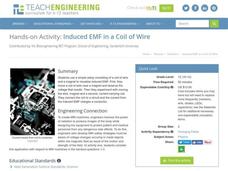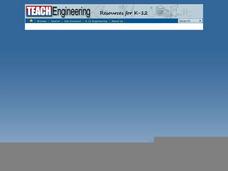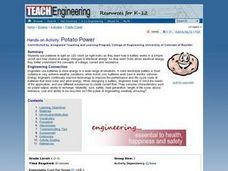Teach Engineering
Ice, Ice, PV!
Knowing the temperature coefficient allows for the calculation of voltage output at any temperature. Groups conduct an experiment to determine the effects of temperature on the power output of a solar panel. The teams alter the...
Teach Engineering
Pointing at Maximum Power for PV
Following detailed directions, teams collect the voltage and current outputs of a photovoltaic cell by adjusting the resistance. Using the collected data, they determine the highest power output. Implications for weather and a large...
Teach Engineering
Can You Resist This?
Some things are hard to resist. Small collaborative groups build circuits and calculate the voltage using Ohm's Law. Budding engineers explore the connection between the voltage across different resistors and linear functions with...
Teach Engineering
Induced EMF in a Coil Wire
Small groups investigate the interaction between a coil of wire and a magnet to create an electromagnetic field and observe the voltage they create. Through further interactions, they realize a conductor can be charged from the...
Bonneville
Can Portable PV Charge Vehicles?
Take charge of learning about electric vehicles. Instructors first provide the class with information about PV modules and batteries. Learners then conduct an experiment where they connect PV modules in series and in parallel to...
Curated OER
Electrons on the Move
Fourth graders study current electricity while constructing a simple electric circuit. They build a galvanic cell to examine the concepts of voltage, current and resistance.
Curated OER
From Sunlight to Electric Current
Learners explore concept of current in electrical circuits. They examine how energy from the sun can be used to power everyday items, including vehicles.
Teach Engineering
Circuits
Don't know how to make the initial connection on electric circuits? This lesson provides the background to present the introductory vocabulary to learning about electric circuits. It is organized in a meaningful progression with an...
Teach Engineering
Maximum Power Point
Investigate the maximum power output of a photovoltaic panel with a instructional activity that introduces the class to the maximum power point. Individuals learn how to determine the maximum power point of a solar panel by using Ohm's...
Teach Engineering
Both Fields at Once?
An MRI uses both a magnetic and electricity, so how do the two interact with each other? Class members observe the effects on a charged particle when it is subject to both an electrical and magnetic field. The teacher background...
Teach Engineering
The Temperature Effect
How temperature affects the efficiency of a solar panel is the focus of the third in a series of eight resources that presents how engineers are able to control the temperatures of photovoltaic panels. Class members find out how the...
Teach Engineering
Applications of Linear Functions
It's not so straightforward — lines can model a variety of applications. Pupils experience linear relationships within the context of science, including Hooke's and Ohm's Laws. Class members got a taste of motion and speed from the...
Teach Engineering
Ampere's Law
Help your class find the the magnetic field of a toroid, a solenoid bent into a circle with an activity that allows the class to see how a loop of wire carrying an electrical charge behaves much like a magnet. The resource provides the...
Curated OER
Potato Power
Students light a LED clock or light bulb using potatoes. They examine how a battery works in a simple circuit. They determine how chemical energy changes to electrical energy while experimenting with potato powered circuits.
Curated OER
Taking Apart Electrical Appliances
Young scholars discover that electrical appliances are made up of individual components that work together. They, with partners, demonstrate to others how their piece of equipment or appliance works by taking it apart and examining the...
















